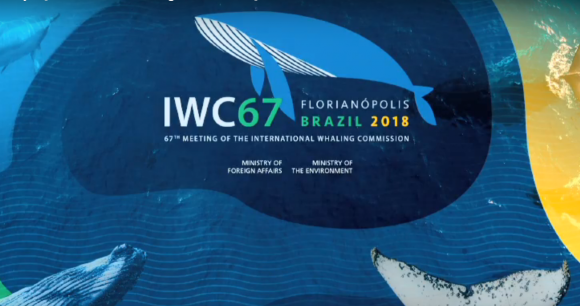
Florianopolis, Brazil—As the International Whaling Commission meeting wrapped up this week, members voted on several key measures that will impact whales for years to come. Although the proposal for the creation of a South Atlantic Whale Sanctuary was defeated, there were a number of positive outcomes that strengthen the protection of whales.
The Animal Welfare Institute (AWI) is particularly pleased that Japan’s Way Forward proposal was roundly rejected by the member governments attending the 67th annual meeting. As noted in our recent joint report with the Environmental Investigation Agency, this proposal would have allowed large-scale commercial whaling to resume.
“Forty-one nations, including the United States, refused to allow Japan to open the doors to the excesses and barbaric cruelty involved in commercial whaling,” said D.J. Schubert, wildlife biologist for AWI. “That only 27 countries voted in favor shows that the global community is continuing to move away from this cruel and unnecessary industry and toward the nonlethal and nonconsumptive use of whales.”
The commission also adopted a resolution—the Florianopolis Declaration—which provides a vision for a new conservation-oriented IWC. Other approved resolutions address ghost gear (abandoned or lost fishing gear that continues to catch and kill many marine species), anthropogenic noise, and cetacean and ecosystem functioning. Of these three resolutions, the first two passed by consensus, and the third by a vote of 40 in support and 23 opposed. AWI has played a key role in highlighting the enormous ecological benefits that whales and other cetaceans provide to the environment, helping to organize a workshop on the issue and releasing a report, “The Role of Cetaceans in Ecosystem Functioning: Defining Conservation Policies in the 21st Century.”
The IWC also agreed to support the strategic plan of the Bycatch Mitigation Initiative, which aims to promote effective bycatch prevention and mitigation measures worldwide. Given that more than 300,000 whales, dolphins and porpoises die each year due to bycatch entanglement, this work is especially important. AWI participates in the associated working groups on this issue.
Regarding Aboriginal Subsistence Whaling (ASW) issues, new catch quotas were accepted for indigenous communities in Greenland, the Russian Federation, St. Vincent and the Grenadines, and the United States. The agreement on ASW included a commitment from the Russian Federation to host a workshop to address the immensely cruel hunt of gray whales.
“What could have been a disastrous week for cetaceans ended up with some critical victories that will continue to see the IWC promote the conservation, not persecution, of whales,” Schubert said.
Margie Fishman, (202) 446-2128, [email protected]